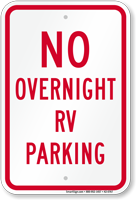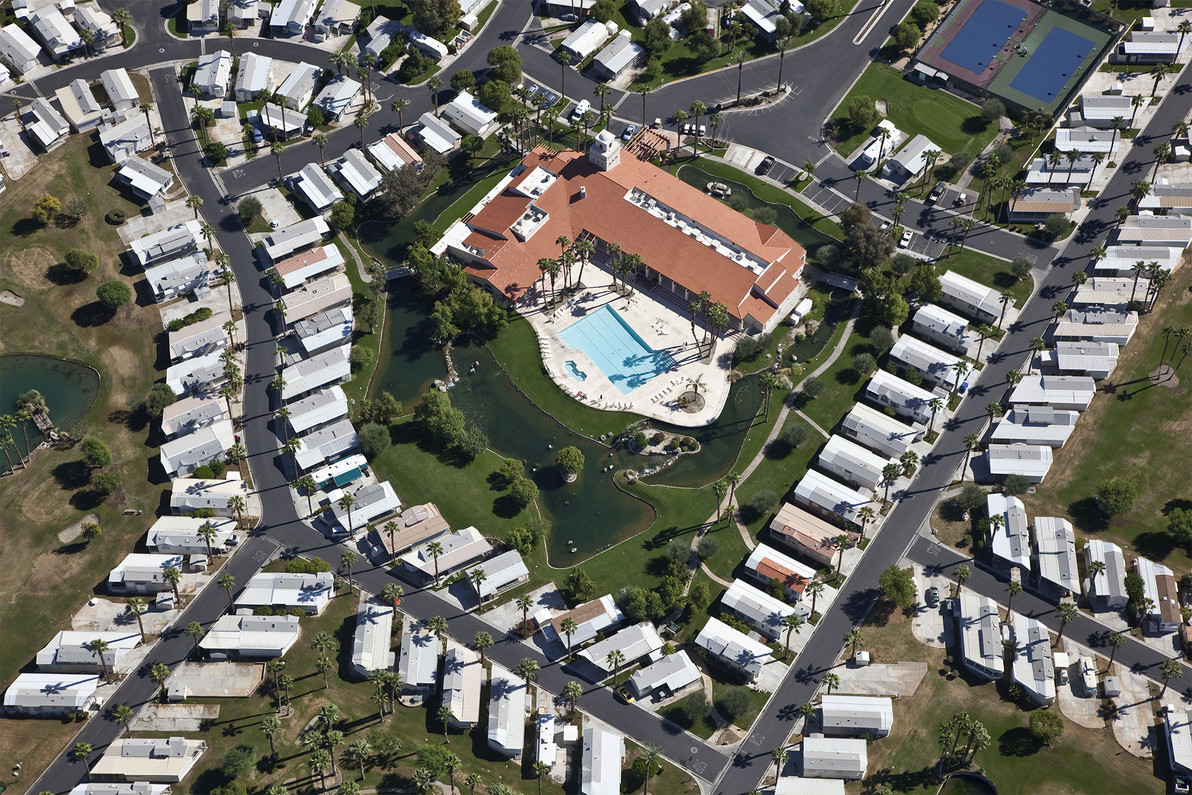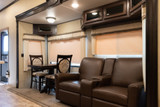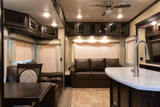The Ten-Year Rule: Discrimination or Discernment? (What other rules and organizations are out there limiting RVers?)
What is the “Ten-Year Rule”? To savvy (or unlucky) RVers around the world, they know it’s an unwritten law that states if your RV is older than a decade you will not be allowed to stay at certain RV parks, resorts, or campgrounds. While this “rule” is strictly applied at only a handful of these types of destinations it, nevertheless, exists. Not only does it exist, but to the chagrin of many, it’s totally and completely legal. The other sad truth is that it’s only a strict rule at a small number of resorts, but it is a “soft rule” at many others. While not on paper, the campgrounds enforce it in their own way, nonetheless. How? How could a rule like this exist and, let alone, be legal? It’s the same reason stores and restaurants can put signs in their windows that say, “No Shirt, No Shoes, No Service.” Privately-owned businesses have the right to refuse service to anyone who does not adhere to their community guidelines. As long as that perceived discrimination doesn’t include age, culture, religion, gender (or lack thereof), and racial affiliation. Some agree that businesses are owned by citizens and should be afforded the freedom to refuse, others, not so much. There are those that would argue that if you are a business and open yourself to public access, you assume the dangers and benefits that go along with such an endeavor. Others in the fight against these types of campground rules say that it is a form of low-key discrimination. That older RVs, well-kept, should be allowed right alongside with their descendants. There are others, like social media poster Flightferal00010 that say, “Campgrounds that discriminate against people with older RVs are participating in a form of class discrimination. If you don’t have $250,000 to buy a new Class “A”, then in these campgrounds’ eyes, you’re garbage. Whether it’s a Caste system, class, or financial discrimination…it isn’t right.” There are groups out in the world that actively work on both sides of the issue. An example of a group working for the campgrounds is a powerful entity that lobbies local code enforcement agencies all over the country, named the ARVC (National Association of RV Parks & Campgrounds.) This group pushes for better legislation governing RV parks and campgrounds so that life is easier on RV and campground owners, alike. There are others who say the purpose of the ARVC is to force RV owners to stay at campgrounds, only. They do so by lobbying local governments to enforce “No Overnight Parking” ordinances for RVs at places like Wal-Mart, Cracker Barrel, and truck stops.

While the ARVC actively works against RVers, and for campgrounds, by telling people how to lobby local governments (a simple instruction manual that they had on their website that was promptly taken down when the general RV public got wind of the piece) they are effectively tying the hands of older RV owners. You can’t park your RV overnight due to local legislation, but you can’t park at the local campground because your RV is too old. It’s the worst kind of “Catch 22” for classic owners. One commenter at roadtrekking.com stated, “One of the stated missions of ARVC is to influence legislators to institute and/or enforce parking bans in public places where RV’s are otherwise welcome. ARVC actively urges and assists members to pressure their towns to prohibit parking at public places so that RVers have no choice but to stay at a nearby … campground. Such parking bans extend to temporary street side parking in some cities and towns. Not only has this has resulted in the denial of the right of private property owners to determine who shall have the use and enjoyment of their property but it has eroded our basic freedom to choose!” There are challengers of these rules and practices on the other side as well. Websites like overnightrvparking.com and rvunfriendly.com (shuttered) actively seek out campgrounds that are unfriendly to old RVers or participate in creating no overnight parking areas that restrict RVers. They list them on their sites so that others can be aware of what they may end up facing out there on the road. It’s important to look at all sides of an issue before coming to any sort of conclusion. Before saying one group or the other is right, consider the following:
WHY THESE RULES CAN BE A GOOD THING:
- Whether you like it or not, community standards may seem a bit prudish and discriminatory, but they have a purpose. With human beings, you have a variety of levels of standards that are out there. Where one person keeps their rig meticulously clean and in great operating condition, another rolls like Cousin Eddy from National Lampoon’s Christmas Vacation and thinks nothing of it. This is a problem.
- These campgrounds have the right to present their privately-owned businesses in the best manner possible. By allowing “junkers” to roll into, and stay in, their campgrounds they could potentially decrease the value of the property (from long-term renters.)
- They could lose a loyal customer base because of nuisance tenants.
- The perception, while possibly misguided, is that if the owners of those unkempt RVs don’t care about their own vehicles, what makes anyone think they’d be good campground neighbors and take care of the area around them?
- If an RV is in an uncared-for condition, there could be oil leaks and other chemical contamination that could pollute the ground and area as a result of their presence. These campgrounds are areas that require continual efforts from everyone from management to the tenants to keep Eco-friendly and in-use for many years to come.
- Reduces noise, air, and visual pollution.
WHY THESE RULES CAN BE A BAD THING:
- They severely limit the freedoms of RVers.
- They cause unsafe driving conditions. If you are completely exhausted and the local laws prohibit overnight parking everywhere except the local campground, what is an owner to do if the campground is full? Travel another 100 miles to the next town? This can endanger the owner and other motorists.
- Many of these campgrounds involved in these practices aren’t well kept. They offer poorly kept camping areas, substandard facilities, and can be generally unsafe. Owners shouldn’t be forced to stay in a place where they fear for their safety when there are plenty of local places like RV-friendly Wal-Marts that allow for a quick overnight rest, have plenty of amenities, and are at least relatively clean. One owner named “Sue,” said, “We have a 1998 Winnebago Itasca very good condition looks good. Some campgrounds have discriminated against us staying at their campground because our unit is too old. Anything over 10 years is considered out of date. Some of these campgrounds should take a look at what they, themselves, are offering. It is not much. So far, we have been very lucky at Walmart, rest areas, and truck stops.”
- They do promote a level of discrimination. The theory being that if you allow a business to discriminate in one way, where will they stop? The old adage, “Give them an inch and they’ll take a mile” has been around a long time because it plays well in human psychology. If a campground forces RVs to be of a certain number in age, what’s next? Will they then only allow blue and tan RVs into their campground? What if they only want Class “A” and Class “C” rigs at their site? What happens to all of the Class “B” owners out there in the world?
- One more freedom-choking rule adds to the already long list of “no-no’s” that exist in the RV world. These arbitrary rules don’t make sense. Some well-kept RVs from a few decades ago cost upwards of $200,000. Do these classy classics not fit the rules of the campground plutocracy?
While these recreational areas are well within their rights to refuse service, there is a growing cry being issued from RVers all over the country, “If we can’t stop, we won’t shop.” What either group needs to understand is that the RV world, where the campgrounds and recreational vehicles each live, is one that needs both entities. Not for survival, but instead for enjoyment and convenience. It is a symbiotic relationship that exists to make traveling easier, convenient, and more enjoyable. Hopefully, both sides can find a middle ground in this low-key war. Otherwise, the parking areas will get fewer and further in-between, and campgrounds will get hit where it hurts the most: their bank accounts. Here are a few suggestions from commenters, owners, and this writer to help bridge the gap and create a positive symbiotic relationship moving forward:
CAMPGROUNDS, RESORTS, AND RV PARKS:
- Allow campers (vehicles) of all ages into your areas - You can maintain your community standards of aesthetics (within reason) and still have some classy campers resting on your property. You would be hard-pressed to find any RV owner out there who would argue against having an old cherried-out SilverStream Tradewind parked next to their rig.
- Stop supporting national organizations who lobby local governments for more restrictive laws that govern RVs and travel - The RV lifestyle is about freedom. Freedom to travel, freedom to see the country, and freedom to park where one would like (within reason.) If you force the hand of the RV community, they will shun you and find creative ways around subverting your laws. Work with RVers. Don’t vilify the owner who is exhausted and only wants to stay one night in the parking lot of a local restaurant or big box store (who have no problem with the RV’s presence.) Going to your campground, registering, parking, setting up, etc. are more of a chore than some can handle if you force them at the last minute to choose your campground only.
- Clean up your act - A multitude of RVers who have no issue with campgrounds, and prefer them over isolationist dry-docking, will avoid a campground (resort or park) like the plague if your conditions are worse than that of a fifth-world country. It is unfair to force the RV owner’s hands with bullied into local legislation, then provide them with squalor. If you make your park an attractive destination, the will want to be there. Follow the prodding heard in the Hollywood blockbuster Field of Dreams, “If you build it, they will come.” If you just take a second to look, you’ll see that one of the largest complaints is the condition.
- Make your campgrounds safer - It seems so simple, but yet so many RV destinations ignore this easy fix to a truckload of problems. While it may seem like a self-solving problem by keeping out undesirables, you’ll find if you take a few extra precautionary steps, RVers will flock to you. More lighting in dark areas. Keep your fencing and gating up to snuff. Make sure your buildings are well-lit and secure. CCTV that is visible but not intrusive. Just a few steps like this will deter many types of undesirable behavior.
- Update your facilities – This should be a no-brainer. While the demographics are pretty static in the RV world, they have been changing over the last few decades. Not only that, but technology’s availability and ease of use has made the proliferation more pronounced worldwide. Basically, from toddlers to octogenarians, everyone is using portable technology. Adding WIFI to your campground, or other technology amenities, will keep you up with the times, and be yet another reason for people to stay.
RV OWNERS
- Be respectful of your campgrounds - These aren’t dumping stations for your bad habits. They’re shared areas that are privately owned. This means not only are you on someone’s property (in spite of their status as a business) but you are surrounded by other RVers who like their peace and quiet. Just a little bit of housekeeping on your end will make your environment better for everyone involved. Obey the campgrounds’ noise restriction times. Clean up after yourself. If they say “No Cabanas” (yes, this is a rule some places) then don’t put up any cabanas. The rules that make life easier for everyone else are definitely ones you should adhere to.
- If the campground does a good job, say so - Tell everyone. Tell the owners. Tell the campers around you. There’s this little unknown thing called the internet and social media where you can share your praises. A kind word, or words, will motivate others to keep levels of performance, or improve upon them!
- Work with your campgrounds whether local or abroad - Help them to work toward helpful legislation that benefits their bottom line, and the comfort of the RVers on the road. By working together, and not against each other, the RV world can be a much better place.
- Keep your RV in good working order - Want to avoid all of these issues and be a good steward of the campgrounds and guests around you? Keep your RV in good running shape. Keep the outside clean and blemish free (as much as you can versus the rigors of the road.) Make sure your exhaust is tight and your moving parts are maintenance regularly so they don’t make noise when you move. If you make your home away from home as nice as it can be, there’s no reason for anyone to give you any problems.
RV CAMPGROUNDS
Recent Posts
-
How to Keep Your Pets Safe While Camping
RVing and camping are a great getaway from the hustle and bustle of work and the city and the day-to …Jul 2nd 2024 -
Why Replace Your RV Furniture?
You may wonder when is the best time to replace your RV furniture. There is no one right answer to t …May 20th 2024 -
Can You Put Regular Furniture in an RV?
Many new and old RV owners ask themselves this question when they feel the need to update th …Apr 25th 2024 -
4 Tips for Securing RV Furniture While Traveling | RecPro
How To Secure RV Furniture There are few things that beat going out on an adventure with an RV …Apr 25th 2024 -
How To Keep RV Furniture From Peeling
Peeling RV Furniture | Why it Peels and How to Stop it Your RV furniture is a point of pride on yo …Apr 25th 2024 -
Turning up the Heat With an RV Fireplace
There’s an unlimited number of cool and exciting features you could add to your recreational vehicle …Apr 25th 2024







